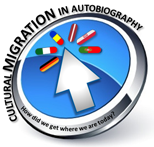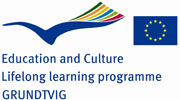
Large Font (+) | Small Font (-)
 E-Book
E-BookProject
Concrete objectives
(Im)Migrants belong to the vulnerable and very often marginalized social groups.
The project aims at developping individual skills and creative capabilities which are helpful for greater success in overcoming social exclusion, gaining basic qualifications and in the training of personal competences.
The project aims at building institutional conditions for greater acceptance of immigrants and for actively including them in public activities.
The project involves regional and local authorities to recognize officially the importance of the history of anonymous people.
The project develops standards for the writing of biographies of (im)migrants. Thus it develops innovative practices in adult education and at the same time organizes their transfer within Europe.
The project supports not only integration on a local level, but also integration in a European context.
The project provides examples of good practice of how to manage cultural breaks in individual history.
The project incorporates the use of ICT-tools and so supports the training in ICT-techniques for participants, tutors and staff of adult education.
Problems to address
Each country, each community and therefore each partner institution has a specific situation to address in as far as immigration and integration of immigrants is concerned. The project therefore starts with a precise description of these situations and communicates them to the partners: origin of the immigrants, reason for immigration, languages spoken by immigrants, percentage of the total population, unemployment figures etc. as main figures. - In all communities there exist groups of immigrants that are marginalized, not yet integrated. The factors: age, sex, education and profession, are important elements for integration. Especially elder people, who are no longer up to establish a new professional career, who are not as parents of school-children connected to everyday life of families, have problems of integration. Therefore it is important to have different age-groups, male and female participants, in our writer’s groups.
Language problems are central. The missing of social contacts, problems at school and at working-place follow.
Approach
Writing autobiographies, reading them to other migrants and to the public is a means to reflect one’s heritage and to articulate cultural differences and the resulting problems. The project supplies an official and accepted setting for this process. It supplies professional help and professional supervision. - Creative writing is trained in small groups. Listening to other people’s stories will be trained, too. Reading of autobiographical texts needs, at the beginning, a small audience. Professional supervision prepares reading to bigger audiences. -
The project creates an European framework: immigrants in different countries learn about their different situations. Different situations have their origin in specific national histories. Participants learn about these histories and about different national views of European history. - The partner institutions build up networks in their local communities and between adult education institutions in different nations. The partner institutions integrate immigrants into adult education programms. They supply a platform to make stories public.

